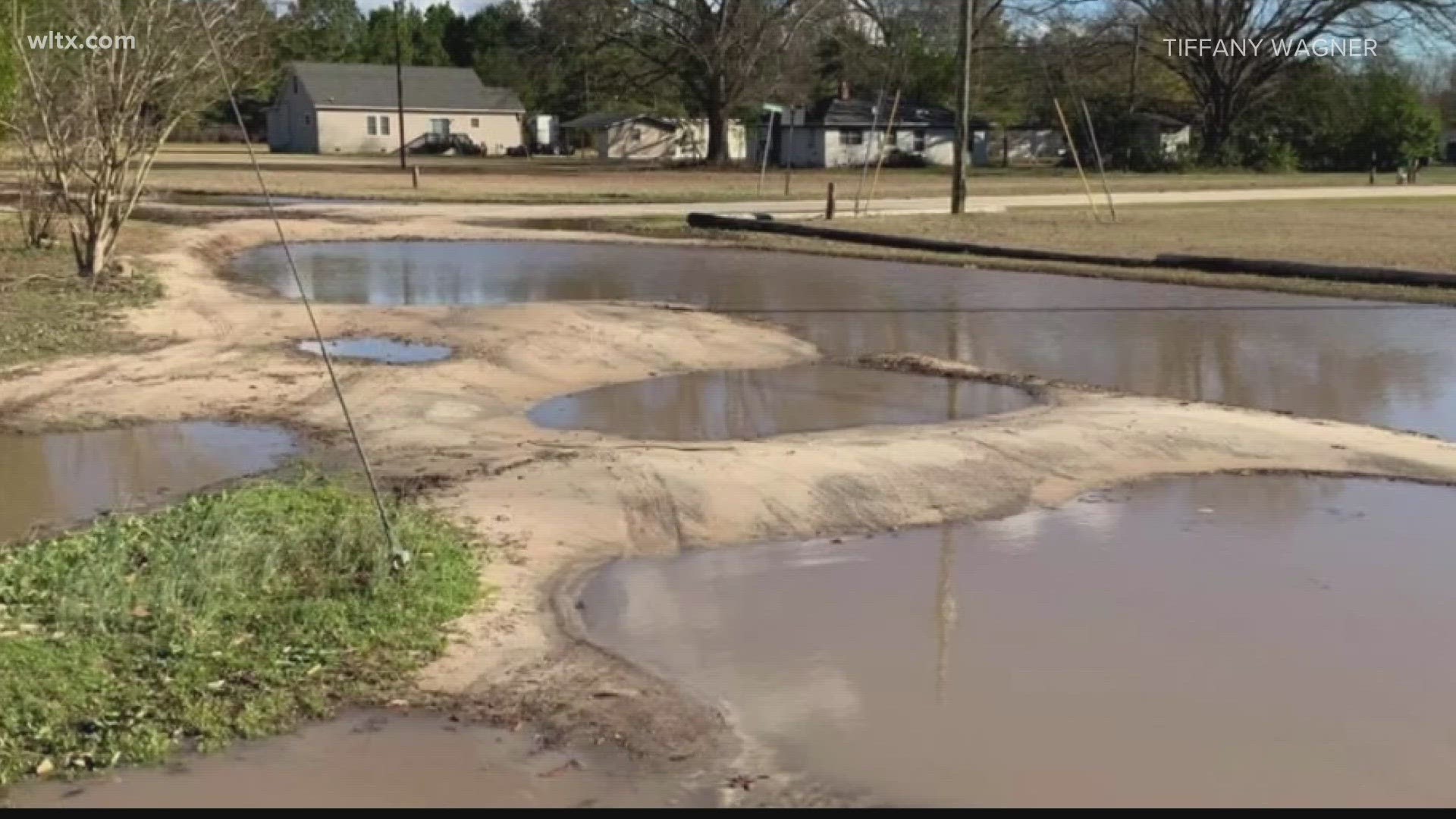SUMTER, S.C. — Sumter County is looking at funding options for a local ordinance that would help residents living on dirt roads in Tuesday night’s Public Works Committee. The group is discussing the proposal, which would have the county pave some of the worst private dirt roads in the county, for the first time.
Throughout the county, Sumter County Public Works says there are 363.85 miles of private dirt roads. For certain residents, living on some of those roads is difficult.
“I pray and I hope and I keep my fingers crossed every day that they will fix this because it is the most stressful thing I've been through in my life financially, physically, mentally,” Sumter resident Tiffany Wagner shares. “There are some days you don't know, especially when we get into the real hard rainy season, if we're going to be able to get out of our home or not.”
Wagner moved into her home five years ago and says she had no idea that the private dirt road she lives on floods often.
“This looks like a pond, like you were literally fishing in a pond. That's how it gets deep,” Wagner explained. “It gets deep, it gets saturated, it gets muddy, it gets wet, and we have to…like you can literally, it comes up to your knees sometimes how deep this water gets in this area right here.”
She says she’s been through four cars since moving five years ago because driving through the water has caused motor and transmission issues. Wagner lives with a heart condition and says in the past when her husband called emergency medical services (EMS) to help her, they were unable to get to her house because of the road conditions.
“If I was here by myself, and I called EMS and the roads were like this, I’d die because nobody could get back there to get me,” Wagner shared.
When there was a fire in her backyard, Wagner says crews could not get there and had to leave the truck back where the road is paved.
“It's scary,” Wagner said. “As a homeowner, I'm petrified every day that I come home that I could lose everything I have because the fire department could not get back here in time.”
County Councilman Carlton Washington is acting as chair of the Public Works Committee meeting during discussion of this ordinance. In Tuesday night’s meeting, he’s asking for a report from the county.
“We need to get our arms around how large the problem is,” Washington detailed. “I'd like to see a report that includes numbers, length of roads, how much it's going to cost to maintain the roads that have the travel difficulty and then once that happens, I think there are a couple of different options. If the number is not an extremely large number, we can probably absorb it in our budget. If the number is an extremely large number, meaning in excess of a million dollars, $2 million or so, then my suggestion would be to make it a part of Penny for Progress.”
In the last local election, however, the one cent sales tax did not pass, losing by less than 1% in 2022. The tax was first implemented in 2008 and renewed once before failing in the third vote. It is now
Despite the tax’s failure to pass most recently, Washington says he thinks this time could be different if residents knew road conditions were going to be addressed.
“Frankly I think it would encourage folks to vote for the Penny for Progress knowing their county government is looking out for their safety, looking out for their law enforcement protection, their educational needs, and their car maintenance,” Washington said.
Residents will be able to vote on that penny tax in the fall.
Councilmembers opposed to the ordinance change say they’re worried that using public funding for private roads may open the county up to a lawsuit.
“My concern is if we don't do it, and something happens to one of our citizens on a road where there isn't ingress and egress, I think we're definitely liable for a lawsuit,” Washington said.
Wagner’s neighbor, Ameer Amin, says when it comes to using tax dollars for private road maintenance, it’s something he’d like to see.
“I'm kind of, kind of dismayed about it,” Amin said about the road conditions. “Either way it goes, I still pay road taxes even back here.”
In addition to the safety concerns, Washington says there’s “a whole other piece of the equation” that he wasn’t aware of until discussion began about the ordinance change.
“I started getting phone calls from parents and then began to have conversations with school teachers and school administrators,” Washington explained. “Buses can't access students when this happens, which means students are attending school late, sometimes missing breakfast and a lot of instances that may be one of only two meals that they've had during the course of a day and so there is a real need to address this issue. The folks that are in this position pay the same taxes that everyone else pays but they're not receiving the same services that everyone else has received.”
Looking to the future, Washington says he will continue to discuss the issue within the Public Works Committee and is awaiting more information from the county to help shape the conversation.

